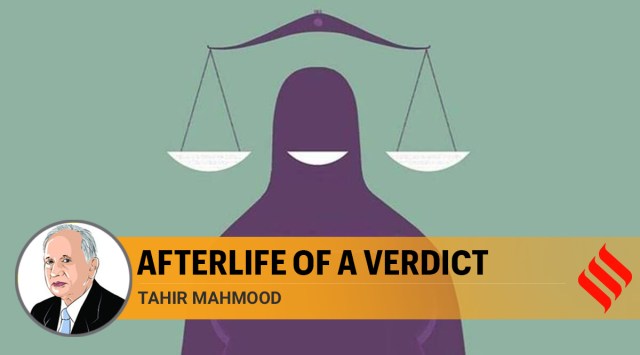
On August 21 three years ago, the Supreme Court pronounced its historic judgment in the much celebrated Shayara Bano case relating to the heinous practice of the so-called “triple talaq” prevalent among the country’s Muslim citizens. In his judgment, the then Chief Justice J S Khehar said, “There can be no doubt, and that is our definitive conclusion, that the position can be salvaged only by legislation; unfortunately, the Union seeks at our hands what clearly falls in its own”. The operative part of the split judgment had declared that, “In view of the different opinions recorded, by a majority of 3:2 the practice of talaq-e-bidat, triple talaq, is set aside.”
The minority judgment in the case had advised the government to enact a comprehensive divorce law for the Muslims on the lines of such laws in several Arab and non-Arab Muslim countries — which the judgment had taken pains to chronicle at length. Instead of bringing in such a law, the government of the day, however, decided in its wisdom to pass a penal law abolishing the practice of triple talaq and making it an offence.
Opinion | Triple Talaq Bill passage is a transformative point in India’s socio-political context
The proposed law was first enforced by two ordinances promulgated one after the other and finally enacted as the Muslim Women (Rights on Marriage) Act, exactly three weeks before the second anniversary of the apex court’s judgment. As the Act completed the first year of its life on the last day of the last month, the Union law minister happily tweeted: “This day will always be remembered as a golden day in the Indian democracy for giving gender justice, dignity and equality to Muslim women by ending the evil practice of triple talaq”.
The Act uses the word talaq throughout its provisions but restricts its meaning by defining the word as “talaq-e-bidat or any other similar form of talaq having the effect of instantaneous and irrevocable divorce”. This definition covers the so-called triple talaq — in which a husband says that he is giving “three talaqs” to his wife, or repeats the word talaq thrice — as also what is known in the traditional Muslim law as a “single irrevocable divorce” in which the husband declares he cannot revoke the talaq he is pronouncing. These are the forms of divorce which textbooks on Muslim law describe as practices “bad in theology but good in law” — a funny proposition, indeed. A constitutionally secular country is not bound to protect by law even what is “good in theology” — of course, theology of any community. It is naive to expect it to legally enforce what is admittedly “bad in theology” in a particular community’s theology.
Opinion | Instead of a separate law on triple talaq, Centre should have framed a just law for all
The Act declares the so-called talaq-e-bidat to be “void and illegal” and also makes it an offence punishable with imprisonment for a term up to three years and fine. The offence is to be cognisable but compoundable. A person arrested for the offence can be released on bail by the court after hearing the wife and being satisfied that there are reasonable grounds for granting bail. The Act also enables the court to order subsistence allowance for the wife and children dependent on her, as also for placing minor children in her custody.
The impression that the Act has repealed the Muslim law on divorce by husbands in its entirety is not correct. Its provisions are restricted in their effect to talaq-e-bidat, the two forms of which have been mentioned above. The proper way of divorce by men as prescribed by the Quran and other authentic sources of Muslim law remains unaffected by the Act. Nor does the Act affect in any sense the provisions of Muslim law on divorce at the instance of women or by the spouses’ mutual consent.
Whether a man has pronounced a talaq as per authentic Muslim law or in violation of its precepts will be a matter to be proved by evidence. In the former case, the Act will not apply. In the latter case it will, and should, apply with all its vigour.
This article first appeared in the print edition on August 26, 2020 under the title ‘Afterlife of a verdict’. The writer is former chairman of National Minorities Commission and member, Law Commission of India